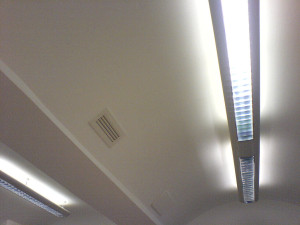Commercial & Industrial Lighting
Commercial and industrial premises can waste up to 80% of their electrical usage 40% through inefficient lighting as our energy efficient lighting Stoke team often detect during our surveys. More and more businesses are looking towards becoming more sustainable and environmentally friendly. With most of Britain’s cities pledging to run on greener energy by 2050.
Phasing Out Inefficient Lighting
The government most retailers and energy companies are seeking to discontinue the use of inefficient lighting across the UK. The European Union is also changing its policies and now traditional filament bulbs have been banned and by 2016 all bulbs, including retrofit halogens will have to be classified as B or above.
How Can You Help to Save Energy?
All business owners should be conscious of just how much energy they are using and how best they can reduce costs. Although you can better save your usage and money by installing energy efficient lighting there are some practices you could do;
- Always switch your premises lights off when everyone has left the building and you are closing for any period of time.
- Be conscious of how many lights you have on and whether they all need to be in use.
- Arrange light switches so that its convenient to turn them off i.e. place switches at top and bottom of stairs, each end of a hallway and each door to a room.
- Use a sensor and timer on external lights so they are only in use when they need to be.
- Similarly, if certain areas of the building are not in constant use consider motion sensor lighting.
- Use appropriate lighting that suits your premises and business functions.
- Regularly review the efficiency of both old and new lighting systems you have installed.
Lighting Technology
Energy efficient lighting is becoming an essential part of commercial premises as inefficient lighting systems are being phased out. Technology for such systems is advancing rapidly and this has given rise to a number of new products on the market. If you are considering upgrading to an energy efficient lighting system, then you should ask the advice from your electrical contractor.
Traditional Lighting
Traditional lighting uses a tungsten filament, incandescent or GLS (General Lighting Service) and was invented over 100 years ago. As you can expect such lighting is extremely inefficient in relation to modern day requirements. Generally, it converts around 5 per cent of the electricity into visible light the light it does emit is yellowish white and is not easy
Halogen Lighting
Again this works on the same principles of filament technology but runs at a higher temperature making them slightly more efficient. However, they are often used in greater quantities therefore increasing the amount of electricity used which defeats the object of its slight potential for efficiency. Although one advantage is that halogen spotlights are brighter than they need to be so if you switch to a lower energy bulb you could reduce costs.
Compact Fluorescents (CFLs)
This particular lighting uses gas inside a glass tube it radiates light by being charged with electricity until it glows. Generally, they use between 75-80% less electricity then standard lighting and last 10 times as long.
Strip lights or Linear Fluorescent Lamps (LFLs)
They work exactly the same as CFL’s only they are different shape often being flatter and longer. In comparison they light up much quicker and produce a better quality light making them highly more efficient. They tend to best suited to areas of commercial premises were brighter light maybe needed.
LEDs
LED’s are probably the most energy efficient lighting alternative available currently. LEDs work by using a simple solid state electronic devices that allows electricity to flow through in one direction producing small but effective amounts of light.
Thoughts from the Energy Efficient Lighting Stoke Team
At One Way Ltd we offer a free lighting Assessment Survey. We will highlight areas in which you could be reducing energy costs, saving your business money and assisting in reducing your carbon footprint. Energy efficient lighting is definitely worth the investment for any business wishing to become further sustainable for future legal requirements and environmental interests.